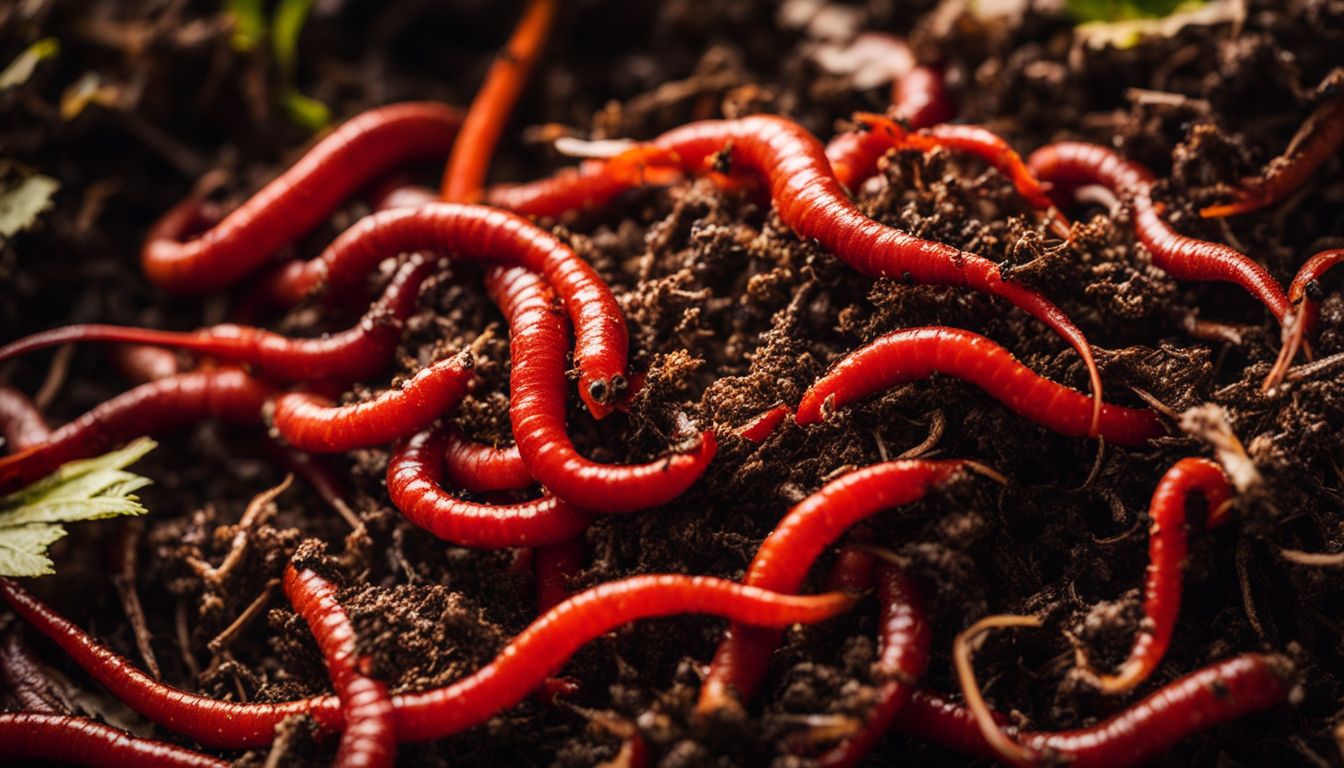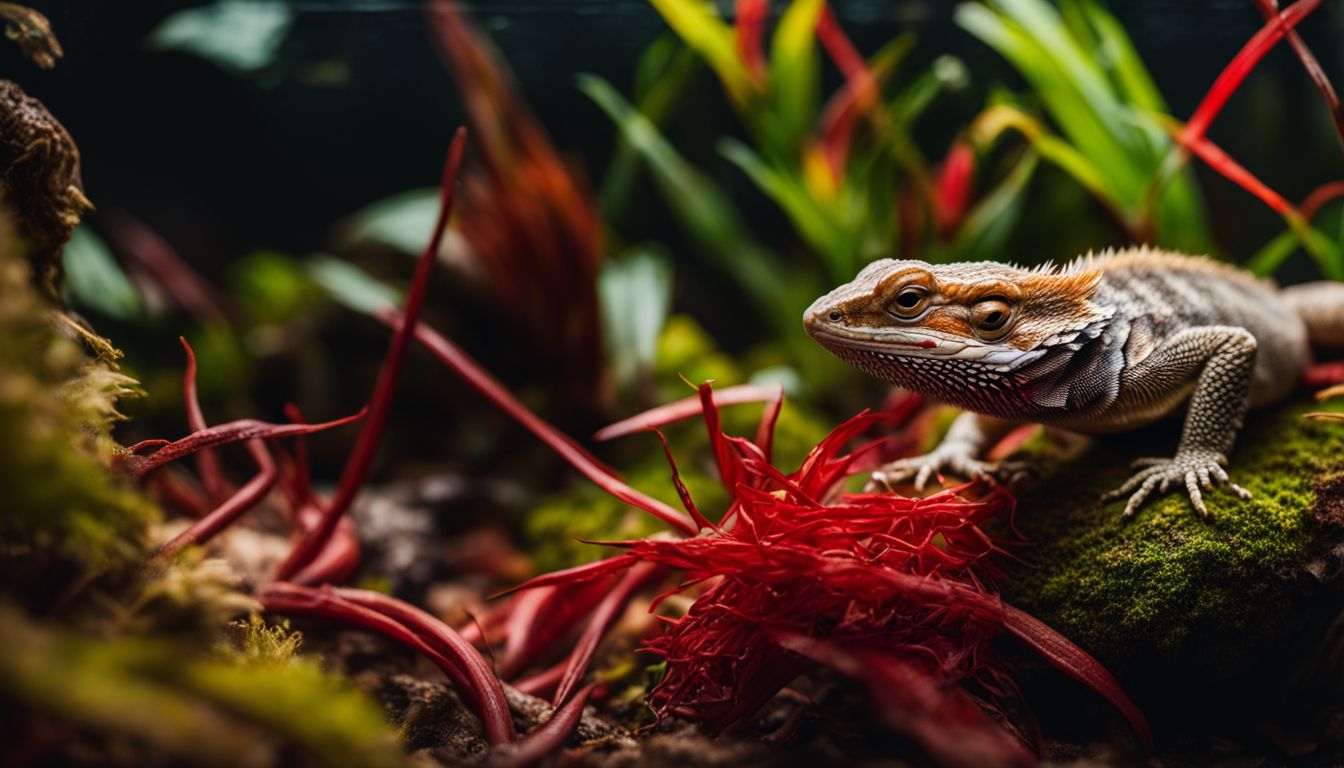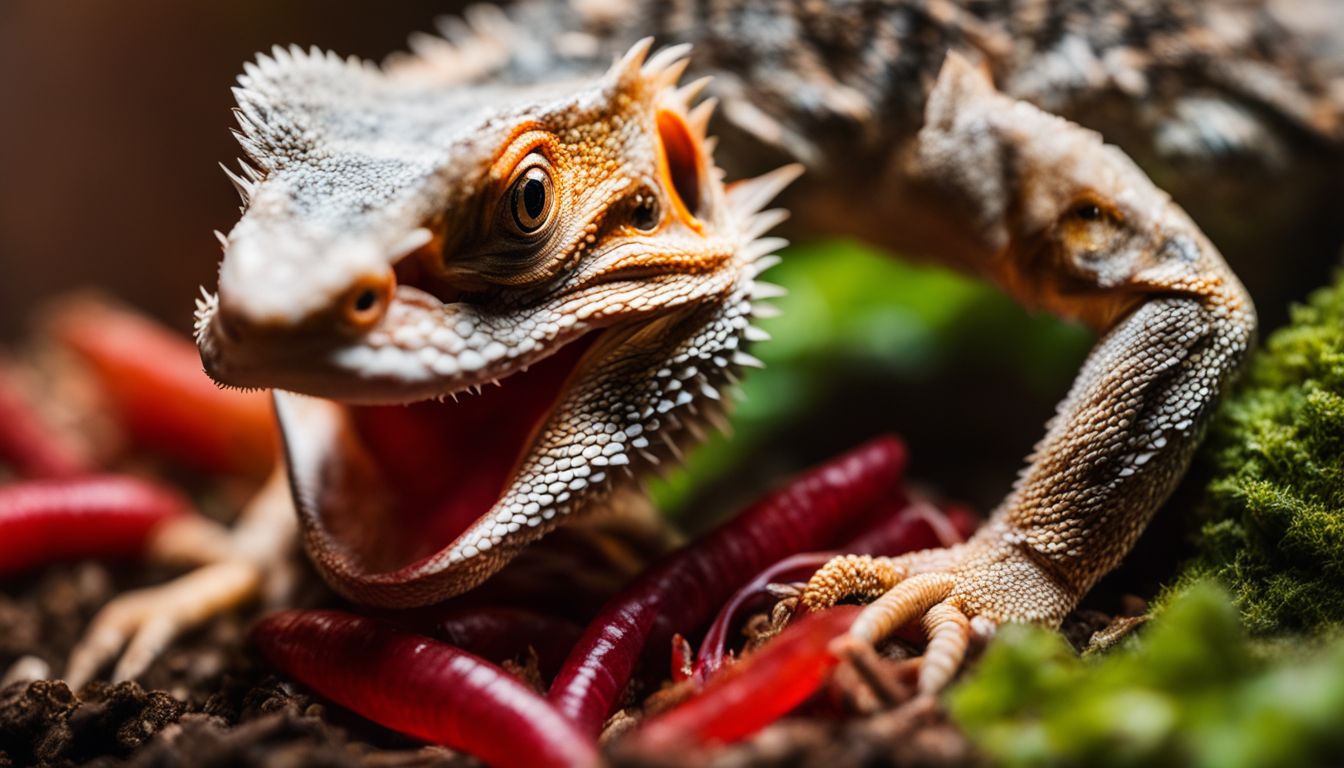Wondering if your bearded dragon can snack on red worms? Red worms are packed with protein and make a healthy treat for these reptiles. This article will guide you through the benefits and potential risks of feeding red worms to your pet, ensuring they get the best nutrition possible.
Get ready to learn everything about it!
Identifying Red Worms

Red wigglers are the red worms we’re talking about. They’re small and often used in composting because they’re great at breaking down organic matter. Unlike their bigger cousins, earthworms, red wigglers thrive in compost piles rather than soil.
These little creatures are easy to spot thanks to their vibrant color and smaller size.
Knowing your worms is crucial for a bearded dragon’s diet. Red wigglers provide valuable protein that’s easy for bearded dragons to digest, but remember – that’s just one part of a balanced diet.
As we consider the nutritional value of red worms next, keep in mind it’s all about variety and moderation for optimal health.
Nutritional Value of Red Worms for Bearded Dragons

Red worms are a treasure trove of nutrition for bearded dragons, providing them with the high protein and low-fat content they need to thrive. These wiggly snacks pack a powerful punch in terms of balanced nutrition, offering not just protein but also essential moisture, vitamins, and minerals that support the growth and overall well-being of your reptile friend.
It’s like feeding them a superfood designed specifically for their dietary requirements.
The beauty of red worms lies in their very low fat yet high amounts of protein—making them an ideal choice for those looking to maintain or improve the health and vitality of their bearded dragons.
They serve as an excellent alternative to traditional insect options in a reptile diet due to this unique nutritional profile. Moving forward, let’s delve into how these benefits can positively impact the health of bearded dragons.
Health Benefits of Feeding Red Worms to Bearded Dragons
Feeding red worms to bearded dragons offers impressive health benefits. These small critters are a powerhouse of digestible protein, crucial for your lizard friend’s growth and muscle development.
They make an excellent addition to a bearded dragon’s diet, providing both protein and fat without the risk of adding too much fat content, which can lead to health issues.
Moreover, the essential nutrients found in red wigglers help support overall well-being. Their low-fat, high-protein composition ensures that bearded dragons get their energy needs met while maintaining a healthy weight.
This balanced approach aids in digestion too, making red worms an ideal choice for reptile nutrition.
Potential Risks of Feeding Red Worms to Bearded Dragons
Potential risks of feeding red worms to bearded dragons include the possibility of parasite transmission. Red worms, when not from trusted sources or properly maintained, can carry parasites that may harm your pet.
Additionally, while red worms are low in fat, overfeeding them can lead to weight gain and potentially obesity in bearded dragons. It’s essential to carefully monitor the quantity and frequency of red worm feedings to prevent health issues related to excessive fat intake.
Parasite risk in reptile feeding is a crucial consideration when it comes to integrating new food into a bearded dragon’s diet. Obesity in bearded dragons resulting from high-fat diets requires cautious handling through balanced nutrition planning and portion control for feeder insects like red worms.
Instructions for Feeding Red Worms to Bearded Dragons
Feed red worms to adult bearded dragons in appropriate sizes and quantities, ensuring they are no wider than the space between the dragon’s eyes. Whether live or frozen, provide red worms every 2-3 days as part of a varied diet for optimal nutrition.
Appropriate Size and Quantity
Ensure red worms are the right size for your bearded dragon’s age and size – juveniles can handle smaller worms, while adults can have larger ones. Follow this guideline to prevent choking or digestion issues.
Feed juvenile dragons worms that are roughly the same width as the space between their eyes, and for adults, choose worms about the thickness of their jawline. Aim to feed red worms once every 1-2 weeks, providing a treat that’s rich in nutrients without overwhelming their diet.
Remember that variety is key!
Live Feeding or Freezing
Bearded dragons can eat live red wiggle worms, offering mental stimulation for the reptile. To feed live red worms to your bearded dragon, ensure they are of an appropriate size – not too big to cause choking or too small to be ignored.
You can also freeze the red worms before feeding them to eliminate any risk of parasites and extend their shelf life.
Considering the nutritional value and preferences of bearded dragons, live red worms provide a good feeding option, ensuring both physical and mental enrichment for these reptiles.
Frequency of Feeding Red Worms to Bearded Dragons
Red worms can be fed to adult bearded dragons once every one to two weeks. However, for juvenile beardies, red worms can be given more frequently — every three to four days is suitable.
The feeding frequency depends on the age of the dragon; younger ones require more regular meals compared to their adult counterparts.
When considering the meal schedule, remember that moderation is key when feeding red worms to your pet dragons. As they have different nutritional needs at various stages of life, adjusting the frequency accordingly ensures they get what’s best for their health and growth.
Alternatives to Red Worms for Bearded Dragons
If you’re considering different options beyond red worms, there are various nutritious alternatives for your bearded dragon’s diet. Nightcrawlers and earthworms are excellent choices as they provide similar nutritional benefits to red worms.
In addition, other worm variations such as mealworms, super worms, and hornworms can add variety to your pet’s diet while offering essential nutrients. Introducing a diverse array of live insects will help ensure a balanced and enjoyable diet for your bearded dragon.
Consider exploring different feeding options that include an assortment of nutritious live insects to provide the best possible nutrition for your pet. Variety in their diet is key to fulfilling all their dietary needs effectively.
FAQs
– Can bearded dragons choke on red worms? Learn how to safely feed red worms and avoid potential choking hazards for your bearded dragon.
– Can I breed red worms at home for my bearded dragon? Get expert insights into breeding red worms as a sustainable and nutritious food source for your pet reptile.
Can bearded dragons choke on red worms?
Bearded dragons can choke on red worms due to their size and texture. Especially for juvenile bearded dragons, the large size of red worms can pose a choking hazard, leading to potential health issues such as food blockages or digestive complications.
It is crucial for bearded dragon owners to be cautious when feeding red worms and only offer them occasionally to minimize the risk of choking or other related problems.
Feeding your bearded dragon a diverse diet that includes appropriately sized insects alongside vegetables is essential for their overall health and well-being. While red worms offer nutritional benefits, it’s vital to ensure that they are fed in moderation and under supervision to prevent any choking hazards or digestive difficulties.
Can bearded dragons of all ages eat red worms?
Introducing red worms into the diet of bearded dragons can provide essential protein without overwhelming their digestive system. Young bearded dragons benefit from gut-loaded red worms to support their growth, while adult beardies can enjoy these nutrient-rich treats in moderation.
The key lies in balancing variety within a well-rounded diet and closely monitoring your dragon’s response to new foods. Remember, understanding the nutritional needs of your specific pet is crucial for making informed feeding decisions – ensuring they thrive throughout every stage of life.
Can I breed red worms at home for my bearded dragon?
Breeding red worms at home for your bearded dragon is feasible. This can provide a sustainable source of food and ensure that the worms are free from harmful chemicals. Red worms are low-maintenance, making them an ideal option for novice breeders.
You’ll need a suitable container with proper ventilation and quality soil to create a conducive environment for breeding red worms. Remember, maintaining the appropriate moisture and temperature levels is crucial for their growth.
By following these steps, you can successfully breed nutritious red worms at home for your bearded dragon’s diet.
Conclusion
In conclusion, bearded dragons can eat red worms as they offer high protein and low fat content. Red wigglers are safe and nutritious for dragons of all ages. When feeding red worms, consider their size to prevent choking hazards.
Remember to offer a varied diet including alternatives like superworms or earthworms. Always monitor your dragon’s dietary needs and enjoy providing them with the best nutrition possible!
For more information on what bearded dragons can eat, check out our guide on whether bearded dragons can eat turkey.
FAQs
1. Can bearded dragons eat red worms as part of their diet?
Yes, bearded dragons can eat red worms as an occasional treat, but they should not be a staple in their diet.
2. Are there any risks associated with feeding red worms to bearded dragons?
Feeding too many red worms can lead to nutritional imbalances and potential health issues for bearded dragons.
3. How often can I feed red worms to my bearded dragon?
It is best to limit the intake of red worms to once or twice a week for adult bearded dragons, while younger ones may have them less frequently.
4. What other food items should I include in my bearded dragon’s diet besides red worms?
A well-rounded diet for a bearded dragon includes insects like crickets and roaches, leafy greens, and vegetables.
5. How do I prepare and serve red worms for my bearded dragon?
Before offering them to your pet, ensure that the red worms are appropriately sized and gut-loaded with nutritious foods.




